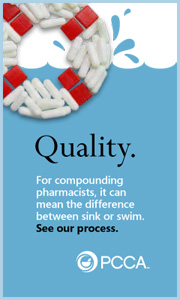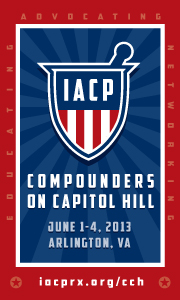|
|
|
 |
| |
 Letter from the Editor Letter from the Editor |
|
Editorial: Documentation vs Opinion on Compounding Regulatory Activities I
There has been a lot of activity by regulatory agencies and organizations since the unfortunate events a few months ago. Some of the activity is warranted and some may not have been done appropriately. Some observations include the following:
- The recent 483 inspections were done by experienced U.S. Food and Drug Administration (FDA) inspectors, each averaging up to 200 FDA inspections of manufacturers involving Good Manufacturing Practices (GMPs), not Good Compounding Practices (GCPs). (See http://fdazilla.com/483s/inspectors/ for information on the individual inspectors.)
- Some "consultants" have been used that have made some observations and recommendations based on GMPs and not on GCPs.
- There appears to be some knee-jerk reactions based on emotions and not on appropriate regulatory issues and standards.
- Pharmacies should be held to the GCPs chapters in the United States Pharmacopeia (USP) by all state boards of pharmacy.
It is critical that both USP <795> (emphasizing chemical and physical stability) and <797> (emphasizing sterility) be used together, along with additional chapters, to get the full scope of the standards. Throughout this series, we will look at some of these 483 observations and Board of Pharmacy actions and try to provide the documentation surrounding these specific activities. In this first issue, we will look at the following observation.
Observation: The pharmacy dispenses sterile preparations prior to receiving the results of the sterility tests.
USP <797> Standard:
FINISHED PREPARATION RELEASE CHECKS AND TESTS
Sterility Testing
"All high-risk level Compounded Sterile Preparations (CSPs) that are prepared in groups of more than 25 identical individual single-dose packages (e.g., ampuls, bags, syringes, vials) or in multiple-dose vials (MDVs) for administration to multiple patients or that are exposed longer than 12 hours at 2� to 8� and longer than 6 hours at warmer than 8� before they are sterilized shall meet the sterility test (see Sterility Tests <71>) before they are dispensed or administered."
"When high-risk level CSPs are dispensed before receiving the results of their sterility tests, there shall be a written procedure requiring daily observation of the incubating test specimens and immediate recall of the dispensed CSPs when there is any evidence of microbial growth in the test specimens."
Editorial Comment
USP <71> Sterility Test requires an incubation period of 14 days. The beyond-use-dates that can be assigned to high-risk CSPs without sterility testing are not more than 24 hours at controlled room temperature, not more than 3 days at refrigerated temperature, or more than 45 days in solid frozen state between -25� and -10�. If sterility testing is successful, then the beyond-use date (BUD) for aqueous liquids follows USP <795> as 14 days for aqueous liquids and up to 6 months for non-aqueous liquids. As is evident, for aqueous injections, the 14-day BUD if sterility tested is already exhausted during the 14 day incubation period required for sterility testing. An exception would be documentation of an appropriate extended BUD.
However, the USP standard in the second paragraph in this section allows for dispensing prior to receiving the results of sterility testing provided there is adherence to the stipulations regarding notification, etc.
Loyd V. Allen, Jr., PhD, RPh
Editor-in-Chief
International Journal of Pharmaceutical Compounding
Remington: The Science and Practice of Pharmacy
|
| |
| Announcement |
|
International Journal of Pharmaceutical Compounding, Inc. is currently working with the King Guide to Parenteral Admixtures and anticipate it will be available through www.CompoundingToday.com in the very near future.
|
| |
| News |
|
Compounding Industry Representative: Greed to Blame for Meningitis Outbreak
Greed was at the center of the deadly fungal meningitis outbreak, and it violated "so many" standards, says an industry leader. However, state regulators are also at fault in the fiasco, says David Miller, CEO of IACP. Miller blames "Greed. Plain and simple. Greed" for the company's downfall. "They saw an opportunity to make money whether it was right or wrong. They did it."
http://www.metrowestdailynews.com/archive/x522260957/Compounding-industry-rep-Greed-to-blame-for-meningitis-outbreak
FDA Given Authority Over Compounding Manufacturers in Draft Bill
The FDA would gain greater authority over pharmacies that compound sterile drugs and ship them across state lines under proposed legislation. The draft proposal distinguishes between "traditional" compounding pharmacies and "compounding manufacturers" which make products without prescriptions for physicians to keep for future use.
Iowa Democrat Tom Harkin, chairman of the Senate health committee that developed the draft legislation, states that "By clarifying FDA authority over high-risk compounding practices, this bill will enhance protections for patients taking compounded drugs and help prevent crises like last year's tragic meningitis outbreak." This bill creates a new class of compounding manufacturer that would be regulated by the FDA but would be exempt from the full raft of regulations that apply to traditional pharmaceutical companies.
Compounding manufacturers would not be required to submit their products to the FDA for approval before selling them. Also, they would not be required to negotiate the labeling of their drugs with the FDA; they would only be required to indicate that the products are compounded and list certain other specified information. Compounding manufacturers would no longer be licensed as pharmacies; they would be required to register with the FDA, and report to the agency any problems reported by patients or physicians. They would also be required to pay an annual fee to defray the cost of FDA inspections.
Compounding manufacturers would not be allowed to compound biologic products made from live organisms or other complex drugs. In addition, they cannot compound FDA-approved drugs unless they are in short supply. Traditional compounding pharmacies would continue to be licensed and regulated by state boards of pharmacy.
http://www.reuters.com/article/2013/04/26/us-meningitis-legislation-idUSBRE93P0RV20130426
|
| |
| IJPC Now on Facebook |
|
Become a fan of the IJPC Facebook page and share ideas, photos, and keep up to date with the latest compounding information - http://www.facebook.com/IJPCompounding
|
| |
| Available |
|
A good friend and long-time supporter has retired and has a complete set of IJPC available. For information, send me an email, and I will provide his phone number: lallen@ijpc.com
|
| |
| Did You Know ... |
|
�that a "setup" has occurred over the past few months where compounding pharmacies were deliberately set up to fail the inspections by using inappropriate inspection standards?
|
| |
| Tip of the Week |
|
If an agency inspects a local restaurant using standards set up for Kraft Foods, Coca Cola, etc., don't expect the local restaurant to do well. However, you will read about it and see it in the local and national news media! The lesson learned is you can't push the toothpaste back into the tube, and their reputation is already tainted!
|
| |
| Looking Back |
|
Clancy's whiskers
Tickle Nancy,
Nancy lowered the boom
On Clancy!
Burma Shave
|
| |
| PCAB Accreditations |
|
PCAB is proud to announce the accreditation of the following pharmacies:
Harbor Compounding Pharmacy, Costa Mesa, California; Mai Tran, PharmD, mtran@harborcompounding.com. Initial Accreditation for Sterile and Nonsterile Compounding
Avera Compounding Pharmacy, Sioux Falls, South Dakota; Karen Hoffman, PharmD, karen.hoffman@avera.org. Re-Accreditation for Nonsterile Compounding
|
|





